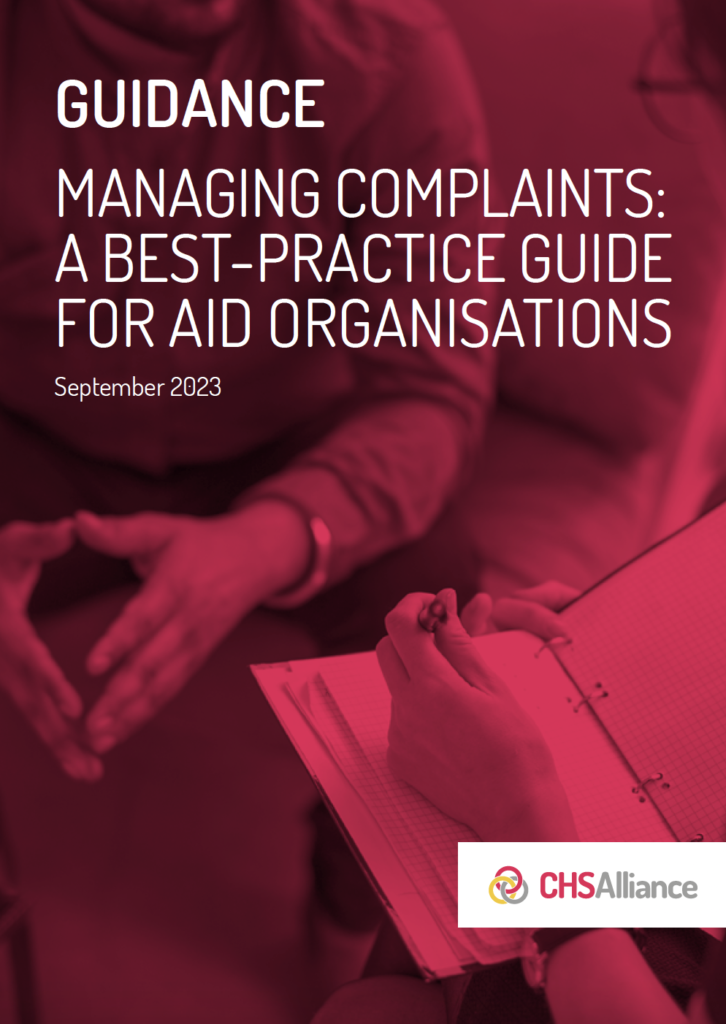Meeting CHS Commitment 5: five best-practice tips when responding to complaints
People affected by crises have a fundamental right to voice their complaints to aid organisations and receive a timely and appropriate resolution to address their concerns. An effective complaints system is a foundational pillar for organisations applying the Core Humanitarian Standard (CHS).
Complaints also serve as crucial alerts, highlighting potential misconduct or shortcomings. All organisations are susceptible to fraud and abuse. Therefore, a reliable complaints system plays a vital role in identifying and tackling malpractice, manipulation or exploitation effectively.
A well-structured complaints mechanism plays a pivotal role in fostering transparency, nurturing trust and eliciting critical feedback for continuous improvement. Such a system ensures that the voices of those supported by aid organisations are not only heard but also respected, fostering two-way engagement between community members and staff.
However, CHS Commitment 5 on complaints being welcomed and addressed consistently scores the lowest among CHS verification scores. In fact, this Commitment has been on average the lowest scoring since the creation of the CHS. This signals that despite efforts to improve, organisations are still failing the people they help and missing important warning signs for wider problems.
Five key elements of successful complaints management
For a complaints management process to be successful, it must be anchored in these core principles, taken from the new guidance:
- Make it visible and accessible: The complaints process must be highly visible and easily understandable to all involved with a crisis response. This means that people affected by crisis will know how to share complaints, and staff will know how to deal with them.
- Treat complaints confidentiality and safely: Upholding privacy and ensuring the safety of complainants are crucial to creating trust and encouraging open people to share their concerns, free from fear or intimidation.
- Respond promptly and be culturally sensitive: Addressing complaints in a timely and culturally appropriate manner shows respect and makes it more likely to resolve issues effectively.
- Analyse feedback to learn: Viewing complaints as opportunities for learning, organisations should routinely review and analyse concerns shared to identify trends and areas for improvement.
- Improve over time: Continually updating and refining the complaints process involves ongoing staff training, monitoring effectiveness and adapting based on feedback and evolving needs.
CHS Alliance’s new Managing complaints package, funded by USAID, helps organisations to apply this best-practice. It consists of:
- A comprehensive best-practice guide on how organisations should respond to complaints they receive.
- A practical toolkit with ready to use best-practice templates and examples.
- An accessible e-learning series that walks users through setting up and managing a complaints mechanism (available soon).

The package aims to help humanitarian and development organisations, regardless of their size or location, to develop or update an effective complaint management mechanism. It supports organisations to maintain consistent practices across diverse communities and different contexts, meaning more crisis-affected people will receive the accountable support they deserve.
CHS Alliance encourages all organisations striving to better meet the CHS to make the most of these new resources, to create robust and effective complaints systems that authentically reflect the needs and voices of those they serve.
In the coming months, CHS Alliance will hold a series of activities for our members to explain more about how the package can further support their work.
Access CHS Alliance’s Managing complaints package.
